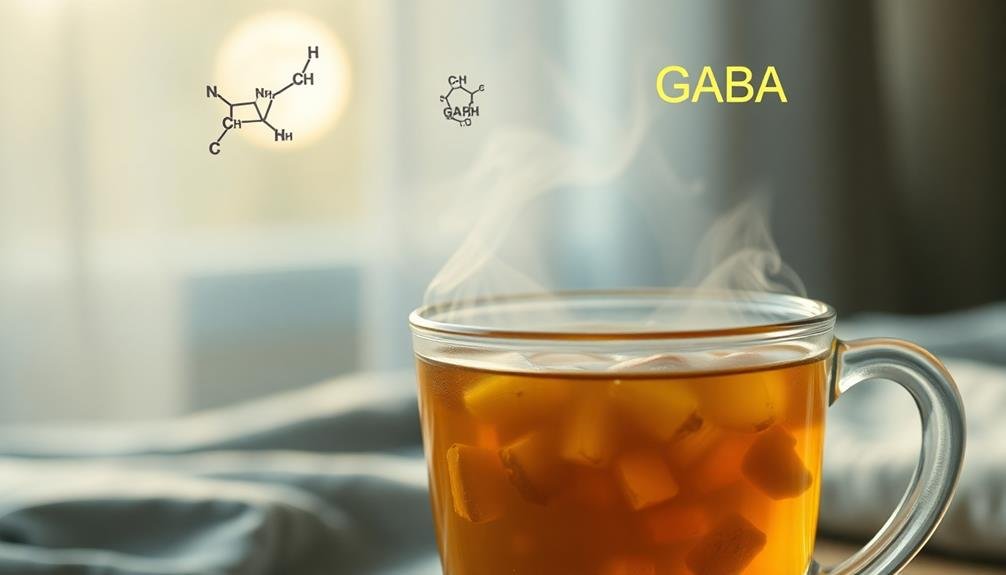Valerian root's effectiveness as a nighttime tea stems from its unique blend of compounds, particularly valerenic acid and valepotriates. These interact with your brain's GABA system, promoting relaxation and easing you into sleep. The root enhances GABA activity, calming your nervous system and modulating serotonin pathways to regulate your sleep-wake cycle. Scientific studies have shown valerian can improve sleep quality and reduce the time it takes to fall asleep. You can prepare it as a tea by steeping 2-3 grams of dried root in hot water for 10-15 minutes. There's more to uncover about this ancient herb's sleep-inducing properties.
Key Takeaways
- Valerian root contains valerenic acid and valepotriates, which interact with GABA receptors to promote calmness and relaxation.
- It increases GABA levels and receptor sensitivity, creating sedative-like effects without the risk of dependency.
- Valerian modulates serotonin pathways, affecting mood and sleep-wake cycles, enhancing its overall sleep-inducing properties.
- Scientific studies have shown valerian root can improve sleep quality and reduce sleep latency in various populations.
- When prepared as a tea, valerian's active compounds are easily extracted, making it an effective and convenient nighttime drink.
Origins of Valerian Root

Native to Europe and parts of Asia, valerian root quickly spread to other regions due to its medicinal value. In medieval times, it was known as "all-heal" and used to treat a wide range of ailments.
The Vikings were also familiar with its properties, often using it to ease anxiety before battles.
You'll discover that valerian root made its way to North America with European settlers, who continued to use it for its therapeutic effects.
Today, it's cultivated in many countries worldwide, including the United States, China, and parts of Eastern Europe. The plant thrives in moist, temperate climates and is often found growing wild in grasslands and woodlands.
Its small, pink or white flowers and tall, slender stems make it easily recognizable in its natural habitat.
Chemical Composition

You'll find that valerian root contains several active compounds, including valerenic acid and valepotriates.
These chemicals interact with your brain's gamma-aminobutyric acid (GABA) system, potentially increasing feelings of calmness and relaxation.
Understanding the chemical composition of valerian root can help you appreciate its effects on your nervous system and sleep patterns.
Active Compounds Breakdown
Valerian root contains numerous active compounds that contribute to its sedative and anxiolytic effects. The most significant of these are valerenic acid and its derivatives, which interact with GABA receptors in your brain to promote relaxation and sleep. Isovaleric acid, another key component, has a calming effect on your central nervous system.
You'll also find a variety of other compounds in valerian root that work synergistically to enhance its overall effectiveness:
| Compound | Function |
|---|---|
| Valepotriates | Muscle relaxant properties |
| Lignans | Antioxidant and neuroprotective effects |
| Flavonoids | Anti-anxiety and stress-reducing qualities |
| Alkaloids | Sedative and pain-relieving properties |
| Amino acids | Support neurotransmitter production |
These compounds work together to create valerian root's powerful sleep-inducing and stress-reducing effects. The valepotriates, in particular, are unique to valerian and contribute to its muscle-relaxing properties. While the exact mechanisms of action for some of these compounds are still being studied, research consistently supports valerian root's effectiveness as a natural sleep aid and anxiety reducer.
Neurotransmitter Interaction Effects
How does valerian root influence your brain's neurotransmitters? The active compounds in valerian interact with various neurotransmitter systems, primarily affecting GABA (gamma-aminobutyric acid). GABA is your brain's main inhibitory neurotransmitter, responsible for calming neural activity and promoting relaxation.
Valerian's effects on neurotransmitters include:
- Increasing GABA levels by inhibiting its breakdown
- Enhancing GABA receptor binding, amplifying its calming effects
- Modulating adenosine receptors, which play a role in sleep regulation
- Potentially influencing serotonin and norepinephrine systems
When you consume valerian root tea, these compounds work together to create a sedative-like effect. They help reduce anxiety, ease muscle tension, and promote better sleep quality.
The tea's impact on GABA receptors is similar to that of benzodiazepines, but without the risk of dependency. Valerian's interaction with adenosine receptors may contribute to its sleep-promoting effects by enhancing the natural sleep-wake cycle.
While research is ongoing, some studies suggest that valerian's influence on serotonin and norepinephrine systems may contribute to its mood-regulating properties, potentially alleviating symptoms of mild depression and improving overall well-being.
Mechanism of Action

You'll find that valerian root's sleep-promoting effects stem from its interaction with GABA receptors in your brain.
This herb enhances the activity of GABA, your primary inhibitory neurotransmitter, which helps calm your nervous system and induce relaxation.
Additionally, valerian root modulates your serotonin pathways, potentially influencing mood and sleep-wake cycles.
GABA Receptor Interaction
One of the key mechanisms behind valerian root's calming effects lies in its interaction with GABA receptors in the brain. GABA (gamma-aminobutyric acid) is a neurotransmitter that helps regulate brain activity and promotes relaxation. Valerian root contains compounds that bind to these receptors, enhancing GABA's effects and potentially reducing anxiety and improving sleep quality.
When you consume valerian root tea, you're introducing these beneficial compounds into your system. They work by:
- Increasing GABA levels in the brain
- Enhancing the sensitivity of GABA receptors
- Inhibiting the breakdown of GABA
- Promoting a sense of calmness and relaxation
This interaction with GABA receptors is similar to how some prescription sleep medications work, but valerian root offers a natural alternative.
It's crucial to acknowledge that while valerian root can be effective, its effects may vary from person to person. Some individuals might experience more pronounced benefits, while others may need to consume it regularly for a period of time to notice improvements in their sleep quality or anxiety levels.
Serotonin Pathway Modulation
Another significant mechanism behind valerian root's effectiveness involves its modulation of the serotonin pathway. Valerian root contains compounds that interact with serotonin receptors in your brain, particularly the 5-HT5a receptor. This interaction can help regulate your sleep-wake cycle and promote relaxation.
When you consume valerian root tea, these compounds bind to serotonin receptors, potentially increasing the availability of serotonin in your brain. Serotonin is a neurotransmitter that plays a vital role in mood regulation and sleep. By enhancing serotonin activity, valerian root may help you feel calmer and more prepared for sleep.
Moreover, valerian root has been shown to inhibit the enzyme that breaks down GABA, indirectly affecting serotonin levels. This dual action on both GABA and serotonin pathways contributes to its overall sedative effect.
It's essential to recognize that while valerian root doesn't directly produce serotonin, its modulation of the serotonin pathway can lead to improved sleep quality and duration.
Research suggests that this serotonin pathway modulation may also contribute to valerian root's potential anxiolytic effects, helping you feel more relaxed as you prepare for bed.
Scientific Studies and Evidence

Examining the scientific evidence behind valerian root's effectiveness as a sleep aid reveals a mixed but promising picture. While some studies have shown considerable improvements in sleep quality and reduced onset time, others have found minimal effects.
You'll find that research on valerian root's efficacy often varies due to differences in dosage, preparation methods, and study designs.
Despite these inconsistencies, several well-designed clinical trials have demonstrated valerian root's potential benefits for sleep. Here are key findings from notable studies:
- A 2020 meta-analysis of 60 studies found that valerian root notably improved sleep quality in adults with sleep disorders.
- A 2011 study showed that valerian extract reduced sleep latency and improved sleep quality in postmenopausal women.
- Research published in 2009 indicated that valerian root may be particularly effective for improving sleep in patients with insomnia and anxiety disorders.
- A 2007 study demonstrated that valerian root extract improved sleep quality without causing morning drowsiness, unlike some pharmaceutical sleep aids.
While more research is needed to fully understand valerian root's mechanisms and ideal usage, existing evidence suggests it may be a promising natural option for those seeking improved sleep.
Preparation and Dosage

Steeping valerian root for a nighttime tea requires careful attention to preparation and dosage for ideal results. To prepare the tea, you'll need 2-3 grams of dried valerian root per cup of hot water. Use a tea infuser or strainer to contain the root pieces.
Pour boiling water over the roots and let it steep for 10-15 minutes. The longer steeping time allows for maximum extraction of the active compounds.
For dosage, it's best to start with one cup of valerian root tea about an hour before bedtime. If you don't notice effects, you can gradually increase to two cups, but don't exceed this amount.
It's crucial to recognize that valerian root can take a few weeks of regular use to show its full effects, so be patient and consistent.
You can enhance the flavor of your valerian tea by adding other sleep-promoting herbs like chamomile or lemon balm. However, avoid mixing it with other sedatives or alcohol.
If you're using valerian root capsules instead, follow the manufacturer's instructions, typically 300-600 mg before bed. Always consult your healthcare provider before starting any new herbal regimen, especially if you're on medication.
Potential Side Effects

While valerian root tea is generally considered safe for most people, it's important to be aware of potential side effects. Some individuals may experience mild discomfort or adverse reactions when consuming this herbal remedy. It's essential to monitor your body's response and consult with a healthcare professional if you have any concerns.
Common side effects of valerian root tea include:
- Drowsiness and grogginess
- Headaches or dizziness
- Upset stomach or gastrointestinal discomfort
- Vivid dreams or nightmares
You should exercise caution when combining valerian root tea with other medications, particularly sedatives or anti-anxiety drugs, as it may enhance their effects.
If you're pregnant, breastfeeding, or have liver disease, it's best to avoid valerian root tea altogether. Some people may also experience allergic reactions, such as skin rashes or difficulty breathing.
It's worth noting that valerian root can interact with alcohol and certain supplements. You shouldn't operate heavy machinery or drive after consuming valerian root tea due to its sedative properties.
If you experience any persistent or severe side effects, discontinue use and seek medical advice promptly.
Combining With Other Herbs

Herbal synergy can enhance the effectiveness of valerian root tea. When you're looking to maximize its sleep-inducing properties, consider combining valerian with other calming herbs. Chamomile is a popular choice, as it complements valerian's sedative effects while adding a pleasant flavor.
Lemon balm is another excellent option, known for its ability to reduce anxiety and promote relaxation. You might also try adding passionflower to your valerian tea blend. This herb has been shown to improve sleep quality and may work synergistically with valerian to help you fall asleep faster.
Hops, commonly used in beer production, can intensify valerian's effects and contribute to a more restful sleep. For those seeking additional stress relief, consider incorporating lavender or holy basil into your valerian tea mixture.
These herbs can help calm your mind and prepare your body for sleep. When combining herbs, start with small amounts and adjust to find your ideal blend. Always consult with a healthcare professional before adding new herbs to your routine, especially if you're taking medications or have existing health conditions.
Frequently Asked Questions
Can Pregnant Women Safely Consume Valerian Root Tea?
You shouldn't consume valerian root tea during pregnancy. It's not proven safe for expectant mothers and may affect your baby's development. Always consult your doctor before using any herbal remedies while pregnant. Stick to safer alternatives.
How Long Does It Take for Valerian Root Tea to Work?
You'll typically feel valerian root tea's effects within 30 minutes to 2 hours after drinking it. It's best to consume it about an hour before bedtime. Everyone's response varies, so you might need to experiment with timing.
Is Valerian Root Tea Addictive or Habit-Forming?
You're unlikely to become addicted to valerian root tea. It's not habit-forming like some sleep aids. However, you might experience mild withdrawal symptoms if you've been using it regularly and suddenly stop. Don't worry, it's generally safe.
Can Children Drink Valerian Root Tea for Sleep Issues?
You shouldn't give valerian root tea to children without consulting a pediatrician first. It's not well-studied in kids, and there could be potential risks. If your child has sleep issues, talk to their doctor about safe alternatives.
Does Valerian Root Tea Interact With Common Medications?
You should be cautious when combining valerian root tea with medications. It can interact with certain drugs, including sedatives, antidepressants, and blood thinners. Always consult your doctor before using valerian if you're taking any medications.
In Summary
You've learned about valerian root's long history, chemical makeup, and how it works to promote sleep. While scientific evidence is mixed, many find it effective. Remember to follow proper dosage and preparation guidelines. Be aware of potential side effects, especially if you're taking other medications. You might consider combining valerian with other calming herbs for enhanced benefits. Ultimately, you'll need to try it yourself to see if it improves your sleep quality.





Leave a Reply